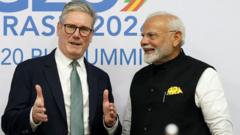

Amidst a backdrop of global trade tensions ignited by President Trump's widespread tariffs, the UK finds itself navigating a complex economic landscape, with potential opportunities arising from unexpected corners. While Trump's protectionist policies have sparked concerns of a global trade war and economic slowdown, they have also created a unique situation where the UK might hold a stronger negotiating position than initially anticipated.
Keir Starmer's government has been actively pursuing an economic agreement with the United States for months. The initial hope was that a trade deal could shield the UK from the impact of Trump's import taxes, avoiding the worst consequences of a global trade war. In February, there were positive signs when Trump hinted at a potential deal where tariffs wouldn't be necessary between the two "great friendly countries". However, these hopes were dashed when Trump announced tariffs on imports from numerous countries, including a 10% tax on all imports from the UK.
Despite this setback, some analysts argue that the UK's position has improved due to the turmoil caused by Trump's tariffs in the stock markets. Faisal Islam, the BBC's economics editor, suggested that the U.S. now needs a deal with the UK more than the other way around. According to Islam, "dropping the ball" with its closest ally would send a "very bad market signal" for America. Furthermore, while Trump justifies his tariffs by pointing to trade deficits, the UK actually had a trade surplus with the U.S. of £1.9 billion at the end of 2024, strengthening its negotiating hand.
However, a trade deal with the U.S. could also complicate the UK's relationship with the European Union. Dr. Mike Galsworthy, Chair of the European Movement, warned that such a deal would "pull the UK further away from a real deal with the EU". He dismissed the idea that the UK escaped relatively unscathed with a 10% tariff, pointing out that numerous other countries face the same situation. Galsworthy also cast doubt on the economic benefits of a U.S. trade deal, stating that they are "deeply unclear".
Alternatively, some have suggested that Britain should ally itself with the EU in its negotiations with Trump and pursue a more expansive trade deal with the EU. Frontier Economics, an independent forecaster, estimates that U.S. tariffs will shrink the UK's GDP by 0.7%, while closer economic ties with the EU could increase it by 1.5%.